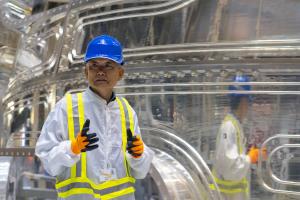Youngeek Jung, head of construction
What Youngeek Jung remembers distinctly about his childhood and teenage years is being hungry and cold. South Korea, where he was born in 1956, was in ruins. "We had nothing. Winters were harsh, with all rivers and lakes deeply frozen." Korea's recovery from one of the most horrific wars of the 20th century (1950-1953) is a story of resilience, determination and almost inhuman effort. "We had absolutely no other resource than the raw force of the working people." Like many in his generation, Youngeek, who was recently appointed head of the ITER Construction Domain, was determined to "study hard and become excellent" in order to contribute to what amounted to his country's resurrection.
Six decades later, both Youngeek and Korea have come a long way from the hardship and misery of the post-war years. (The country now ranks 10th worldwide in terms of gross domestic product.) True to his teenage commitment to hard work and excellence, Youngeek, a chemical engineer by training, rose through the ranks of the nuclear giant KEPCO and largely contributed to building Korea's nuclear infrastructure. "Nuclear energy appealed to us young people. And as Korea doesn't have much in terms of natural resources, we knew it would be key for the country's development."
The early Korean nuclear plants were "turnkey projects" first provided by the United States, then by France. In 1984, two years after graduating from Kyungpook National University, Youngeek was sent to train at EDF, the French public utility—his first contact with the outside world and "a big cultural shock," with everyone owning cars and taking regular holidays. "France appeared to me to be a land of plenty."
From then on, postings in France punctuated his career. He was back in 1988 as a contract manager at the liaison office KEPCO had established in Paris, and again in 1997 when the Korean government sent him to the Paris-based Organisation for Economic Co-operation and Development (OECD), which the country had just joined.
In parallel, at KEPCO, Youngeek kept rising through the ranks. In the mid-2000s he was one of the top managers, with responsibility for construction, quality insurance and export. One of his crowning achievements was the landmark sale of four Korean-design nuclear reactors to the United Arab Emirates in 2009, for which he was awarded the Medal of the Government, one of Korea's highest distinctions.
Five years ago, Youngeek retired from his final position as head of the Kori nuclear complex, the world's largest nuclear site with six operational reactors, four under construction and close to 10,000 employees. Being retired was the first challenge that he did not feel quite up to. "I didn't have much to do. I played golf three times a week, started building a small vacation house, travelled... and a few years passed."
Consulting for the Korean Energy Economic Institute was a welcome diversion. "It was a full-time job, one that put me in contact with the younger generation of economists, and I was very happy." One day, one of his young colleagues mentioned "the big reactor being built in southern France" that had a job opening for an experienced construction manager.
"From that day on I explored the ITER website, read everything, and took the full measure of what was at stake with this project," says Youngeek. "And I thought: this is something worth devoting my knowledge and experience to ..."
Youngeek is aware that building ITER is not quite the same as building a power plant in Korea. "Back home, all those involved shared the same culture and background. This is obviously not the case here. Also, a research installation is different from an industrial project. But the main purpose is to complete construction successfully. And this, I've been doing all my professional life..."
At age 65, Youngeek Jung remains true to his childhood commitment to hard work and excellence. He sees his contribution to ITER as his "final service to the energy future of humankind," and he feels that his "mind and actions are returning to his young age."


